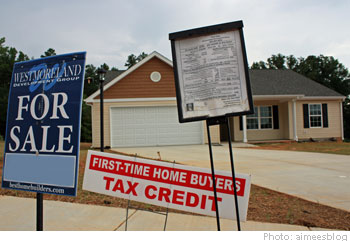 That’s the headline on David Kocieniewski’s article on the front page of the business section of this morning’s New York Times. Successful is defined as giving $12.6 billion to 1.8 million taxpayers who have enough income and a high enough credit score in this economy to buy a house. Most of them would have bought that house without the credit, but its very difficult to prove because we’ll never know how many homes would have been purchased if the credit had not been enacted. We do know that the Treasury Inspector General chided the IRS last September for allowing many taxpayers to claim the credit without having to prove they purchased a home. We also know that housing prices have stabilized in many markets where the credit seems to have been used by many purchasers, and we’ll soon find out whether those prices start sliding again when the credit expires at midnight Friday, April 30. I can’t prove it, but I believe the home purchase tax credit just shifted future home purchase to the present and that we’ll see fewer future home purchases in equal proportion.
That’s the headline on David Kocieniewski’s article on the front page of the business section of this morning’s New York Times. Successful is defined as giving $12.6 billion to 1.8 million taxpayers who have enough income and a high enough credit score in this economy to buy a house. Most of them would have bought that house without the credit, but its very difficult to prove because we’ll never know how many homes would have been purchased if the credit had not been enacted. We do know that the Treasury Inspector General chided the IRS last September for allowing many taxpayers to claim the credit without having to prove they purchased a home. We also know that housing prices have stabilized in many markets where the credit seems to have been used by many purchasers, and we’ll soon find out whether those prices start sliding again when the credit expires at midnight Friday, April 30. I can’t prove it, but I believe the home purchase tax credit just shifted future home purchase to the present and that we’ll see fewer future home purchases in equal proportion.
I am biased by my experience formulating the first homebuyer tax credit enacted in 1975.
This Urban Institute – Brookings Institution Tax Policy Center assessment and this Center for Budget and Policy Priorities paper express my concerns in more detail.
- Bulenox: Get 45% to 91% OFF ... Use Discount Code: UNO
- Risk Our Money Not Yours | Get 50% to 90% OFF ... Use Discount Code: MMBVBKSM
Disclaimer: This page contains affiliate links. If you choose to make a purchase after clicking a link, we may receive a commission at no additional cost to you. Thank you for your support!



For crying out loud, we are already heading toward a national debt of $14 trillion. Why not allow market forces to place housing at their natural levels and save the taxpayers a bundle? When is the insanity going to end.